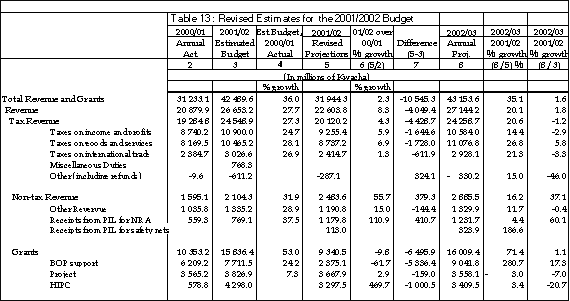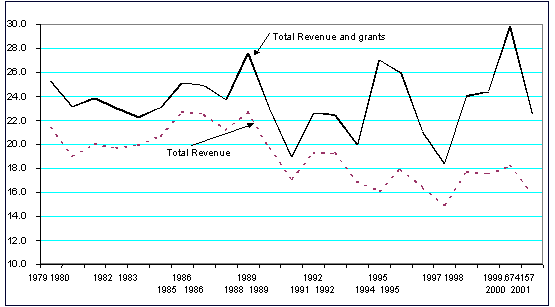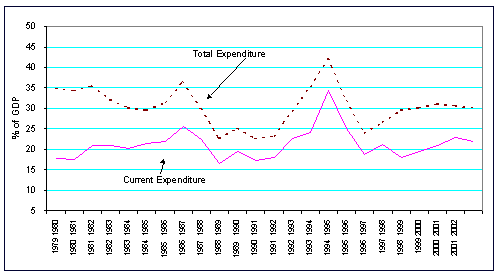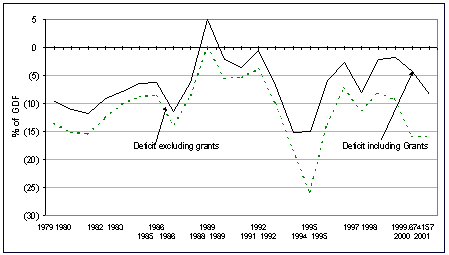
|
|
|
2002/03 POST-BUDGET REPORT
|
|
| 1.2 Overall Performance of the 2001/2002 Budget. |
| |
The 2001/2002 Budget has performed badly. The revised estimates show that some votes were allowed to spend beyond their budgetary allocation whereas other votes suffered big expenditure cuts. The overall picture is that of failure to control the levels of expenditure notwithstanding the large drops in total revenue and grants. Total Revenue and Grants are expected to be some MK10 billion (7.5% of GDP) less than expected. Domestic revenue is expected to be down by MK4 billion (2.9% of GDP). Grants, which were estimated at MK15.6 billion, are now expected to be more than K6 billion (4.2% of GDP) less. At about MK12 billion (8.4% of GDP), the overall deficit including grants will therefore be the worst since the 1994/95 financial year. By registering lower revenues and grants in an atmosphere of uncontrolled expenditures, Government was inclined to supplement its resources by increased borrowing from the domestic market. Net domestic borrowing which was originally to go down by 2.1% of GDP has increased beyond the MK10.2 billion mark or 7% of GDP. Gross Domestic Credit is already more than 14% of GDP with little prospects of improvement in the short term.
1.2.1 Total Revenue and Grants
The 2001/2002 approved Budget estimated total revenue and grants to be at K42.27 billion (29.9% of GDP) from K31.23 billion (29.8% of GDP) in 2000/2001. This would have represented a growth of 36% from last year. Unfortunately, the revised
Table 1: Malawi: Central Government Operations, 2000/01
 |
estimates show that total revenue and grants are just 2.3% up from the 2000/01 level. At MK31.94 billion, total revenue and grants are MK10.5 billion (7.3% of GDP) less than the original estimates. The ratio of total revenue & grants to Gross Domestic Product (GDP) has gone down from 29.8% to 22.4%.
Tax revenue, which was estimated at K24.5 billion, is currently projected at K20 billion (6.4% of GDP). The nominal increase of 4.3% over last year is much less than the inflation rate, which means that tax revenue has decreased in real terms. Last year, tax revenue represented 7.2% of GDP. The main reasons for the under- performance in revenue could be summarised as the following:
- Taxable economic activity has not increased as much as anticipated due to the drought situation in Malawi. Some companies have closed due to the depression in Malawi. Malawi still has not managed to create a macroeconomic environment that is more conducive for private sector development.
- There is a very high rate of tax evasion in Malawi. Unfortunately, the situation is rendered worse by some parastatals that do not pay their taxes and do not remit the surtax and income tax to the Malawi Revenue Authority. MRA should not be impeded in its quest to collect taxes from parastatals.
- There are outstanding cases of companies that evaded tax payments. The Anti-Corruption Bureau (ACB) is handling some of the cases. Judgement on such cases should be expedited and the debtors should be made to pay their dues.
- In the past, not all the repayments from parastatals to Government were included in the budget.
- The extended surtax has not yet been implemented and the provisional tax for minibus operators was reduced and delayed. There was too much haste in expecting these two taxes to start earlier simply because the ground for their successful implementation had not yet been laid. In future, we should learn not to count our chicks before they hatch.
- The dynamism of adjusting tax rates and licence fees does not seem to be applied in some sectors. The licence fee for holding a firearm is ridiculously low and needs to be revised. There are obviously other areas that could be reviewed for more revenue generation without being punitive.
- There are indications that the Malawi Revenue Authority (MRA) is still operating below its potential capacity. There are reasons to believe that MRA cannot be as efficient as it should be, given the legal and operational framework under which it operates. For example, the legal framework should permit the MRA to detain and prosecute tax evaders. However, the MRA currently can only impound the goods in question. All tax measures should be implemented only after extensive consultations with the MRA. The tax amnesty announced more than a year ago, for example, has never been implemented because it was announced before consulting MRA on the modalities of implementation.
Non-tax revenues were expected to increase based on the revenue-enhancing measures announced in the 2001/2002 Budget Statement. Departmental receipts were expected to increase by MK2.1 billion. Particular attention was focused on the Ministry of Lands, Housing, Physical Planning and Surveys. This ministry was expected to generate K778 million in 2001/02 up from K14 million in 2000/2001. Unfortunately, the Ministry of Lands and Housing did not have the capacity to generate this sum in a single year. In addition, K300 million was to be generated from the sale of old motor vehicles by tender and another K300 million from passport fees, driving licence fee and other departmental fees. Some K370 million was expected to come from parastatals that had accumulated arrears due to Government.
The IMF had its doubts as to whether Government had the capacity to implement all the measures. Consequently, the IMF did not include the K2.1 billion in their programme figures. Unfortunately, the IMF was right. This year, departmental receipts are expected to increase to only K1.2 billion, as compared to the K1.0 billion collected last year.
Taxes are a policy instrument and not just an avenue for revenue generation. It is not simply by increasing tax rates and departmental fees that one should necessarily expect more revenue. Policy-makers should be more concerned with the impact of tax policy on economic activity in the real sector and on whether the tax regime will have an impact on the distribution of wealth to benefit the poor in Malawi.
Chart 1.2: Total Revenue and Grants as %age of GDP
(1979/80 - 2001/2002 fiscal year) |
 |
Grants are expected to be K6 billion below the initial estimate of K15.6 billion. Balance of Payment (BOP) Support was initially estimated at MK7.0 billion. However, Malawi received only K1.56 billion during the whole financial year. The International Monetary Fund (IMF) withhold further funding from the Poverty Reduction and Growth Facility (PRGF) under which Malawi was supposed to receive Special Drawing Rights (SDR) of 45.11 million (about $47.5 million US). The PRGF was approved on 21st December 2000 and will expire on 20th December 2003. To date, the amount drawn under the facility is SDR 20.44 million. It is probable that the facility will expire before Malawi withdraws the full-approved amount. The IMF will only release another tranche once they are convinced that Malawi's macroeconomic programme is back on track. Government over-expenditure and the continued accumulation of arrears are the underpinning factors for IMF's withholding of further aid flows.
Following the IMF's position with Malawi's performance under the PRGF, other donors also withheld their aid. Notably, the British Government has not released its pledge of Р€12.5 million of balance of payment (BOP) support. The European Union withheld their Structural Adjustment Facility (SAF) tranche of 15 million Euro (K700 million). The EU prepared an Audit report, which revealed anomalies in procurement procedures with the rehabilitation of Chileka Road, inadequate reporting on amounts spent by the Ministry of Health and Population (Medical Stores) and expenditure of funds on non-eligible items under agreements between the EU and the Government. In addition to cancelling their disbursements, the EU has requested Malawi to refund 7.43 million Euro (about MK500 million). Furthermore, the EU is requesting a refund of 2 million Euro (about MK150 million) expended under the Food Security programme. The Committee notes that the 2002/03 budget includes MK448 million under vote number 277 (Special Activities) for the repayment of European Union funds. The Committee wishes to know whether the amount estimated will be sufficient for the EU to resume its aid to Malawi?
Project grants are flowing as projected. At MK3.7 billion, projections for the financial year are just below the K3.9 billion initially projected. The revised estimate for 2001/2002 is just 3% above the project grants received in 2000/01.
HIPC Inflows and Outflows
The 2001/02 Budget projected HIPC inflows of MK4.7 billion. Inflows have been revised to K3.3 billion for the current budget. Details on the usage of HIPC resources are given in Section 7 of the Budget and Finance Committee’s Pre-Budget Report to Parliament. It suffices to mention that HIPC resources are supposed to be supplementary to Government funds and should not be considered as a substitute. The experience this year has shown that Government reduced its expenditure on budget lines that had HIPC allocations. In other cases, Government stopped direct funding of poverty interventions and relied completely on HIPC resources.
Table 2 (PPEs and HIPC Performance in 2001/02) from Budget Document No 4A gives the approved allocations for the beneficiary PPEs and the percentage of utilisation of HIPC resources. The table shows that total approved allocation of HIPC resources was MK2.93 billion but only MK1.985 billion (or 67.7% of the allocation) was utilised. The Committee wishes to raise the following questions concerning HIPC resources.
- Some ministries used much less than the amounts allocated to them from HIPC funds. For example, Ministry of Commerce & Industry only used 23%, Mining 47.3% and Ministry of Tourism 28.6%. None of the PPEs used 100% of its HIPC allocation. Was there a special reason why some Ministries were not funded as much as others were? What were the criteria for denying funds to those PPEs that received much less than others?
- HIPC inflows are estimated at MK3.3 billion for the 2001/02 financial year. How come only MK1.9 billion has been utilised. Does it mean that the HIPC account at the Reserve Bank of Malawi maintains the balance of MK1.4 billion?
- For the 2002/03 budget, total inflows are estimated at MK3.3 billion. Most of the funds have been already been allocated to different sectors except for MK184 million which remains unallocated. The Committee wishes to know what procedure the Ministry of Finance will use to allocate the remainder. Last year, there was MK1.7 billion unallocated and Parliament was not involved in deciding the activities to get allocations. Instead, it was the Cabinet Committee on the Economy that allocated some of the funds. The Committee thinks that the system of allocating HIPC funds should be more participatory and should therefore include additional stakeholders. The Committee is therefore keen to know the system that will be used instead of that of the Cabinet Committee on the Economy.
- The 2002/03 HIPC allocations are already posted. The question is, who made these allocations and what were the criteria used to determine the beneficiaries? The Committee notes that there are some new activities like 'small scale fish farming and the inspection of primary and secondary schools which are not part of the original list of priority poverty expenditures. The Committee may agree with the choice of these activities to be funded through the HIPC Initiative. However, it is concerned that the choice of activities to benefit from HIPC resources is not conducted in a transparent manner as advocated in the PRSP process. Will the Ministry of Finance be deciding on which activities to fund from HIPC resources without the involvement of any other stakeholder?
- How much is the balance in the HIPC account and how come Malawi did not get all the MK4.7 billion as estimated in the 2001/2002 budget?
1.2.2 Total Expenditure
The 2001/2002 Budget Statement estimated total expenditure at K45.875 billion (or 32.5% of GDP). The amount included K3.5 billion (2.5% of GDP) for payment of arrears accumulated during the 2000/01 financial year. The 2002/03 Budget Documents show that the 'Approved Budget' for 2001/02 has MK40.9 billion in total
Chart 10.3: Total Expenditure and Current Expenditure as %age of GDP
(1979/80 - 2001/2002 fiscal years) |
 |
expenditure. Revised estimates project total expenditure to be MK44 billion and therefore to remain at more or less the same proportion of GDP (30.5% of GDP) as in the 2000/2001Budget. Chart 10.3 graphs the total expenditure / GDP ratio from 1979/ 1980 to the 2002/2003 budget.
Given that total revenue and grants are projected to be K10.5 billion less than the
initial estimates, expenditure should have been reduced proportionately. This is the
Chart 10.4: Overall Deficit (Including grants) and Deficit excluding Grants
as %age of GDP (1979/80 - 2001/2002 fiscal years) |
 |
worst performance of the budget since 1994. The deficit excluding grants is at 15.9%
|
|






